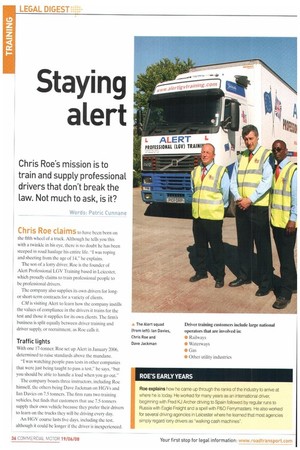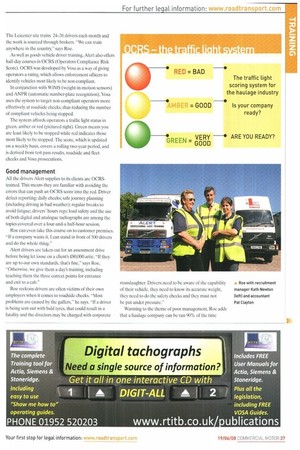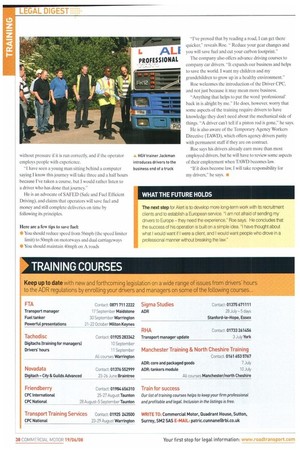Staying alert
Page 36

Page 37

Page 38

If you've noticed an error in this article please click here to report it so we can fix it.
Chris Roe's mission is to train and supply professional drivers that don't break the law. Not much to ask, is it?
Words: Patric Cunnane
Chris Roe claims to have been born on the fifth wheel of a truck. Although he tells you this with a twinkle in his eye, there is no doubt he has been steeped in road haulage his entire life. "I was roping and sheeting from the age of 14," he explains.
The son of a lorry driver, Roc is the founder of Alert Professional LGV Training based in Leicester, which proudly claims to train professional people to be professional drivers.
The company also supplies its own drivers for longor short-term contracts for a variety of clients.
CM is visiting Alert to learn how the company instills the values of compliance in the drivers it trains for the test and those it supplies for its own clients. The firm's business is split equally between driver training and driver supply, or recruitment, as Roe calls it.
Traffic Lights
With one 17-tonner, Roe set up Alert in January 2006, determined to raise standards above the mundane.
"I was watching people pass tests in other companies that were just being taught to pass a test," he says, "but you should be able to handle a load when you go out."
The company boasts three instructors, including Roe himself, the others being Dave Jackman on HGVs and Ian Davies on 7.5 tonners. The firm runs two training vehicles, but finds that customers that use 7.5-tonners supply their own vehicle because they prefer their drivers to learn on the trucks they will be driving every day.
An HGV course lasts five days, including the test, although it could be longer if the driver is inexperienced. The Leicester site trains 24-26 drivers each month and the work is sourced through brokers. "We can train anywhere in the country," says Roe.
As well as goods vehicle driver training, Alert also offers half-day courses in OCRS (Operators Compliance Risk Score). OCRS was developed by Vosa as a way of giving operators a rating, which allows enforcement officers to identify vehicles most likely to be non-compliant.
In conjunction with WIMS (weight-in-motion sensors) and ANPR (automatic number-plate recognition). Vosa uses the system to target non-compliant operators more effectively at roadside checks, thus reducing the number of compliant vehicles being stopped.
The system affords operators a traffic light status in green, amber or red (pictured right). Green means you are least likely to be stopped while red indicates those most likely to be stopped. The score, which is updated on a weekly basis, covers a rolling two-year period, and is derived from test pass results, roadside and fleet checks and Vosa prosecutions.
Good management
All the drivers Alert supplies to its clients are OCRStrained. This means they are familiar with avoiding the errors that can push an OCRS score into the red. Driver defect reporting; daily checks; safe journey planning (including driving in bad weather); regular breaks to avoid fatigue; drivers' hours regs; load safety and the use of both digital and analogue tachographs are among the topics covered over a four-and-a half-hour session.
Roe can even take this course on to customer premises. "If a company wants it, I can stand in front of 500 drivers and do the whole thing."
Alert drivers are taken out for an assessment drive before being let loose on a client's £80,000 artic. "If they are up to our own standards, that's fine," says Roe, "Otherwise, we give them a day's training, including teaching them the three correct points for entrance and exit to a cab."
Roe reckons drivers are often victims of their own employers when it comes to roadside checks. Most problems are caused by the gaffers," he says. "If a driver is being sent out with bald tyres, that could result in a fatality and the directors may be charged with corporate manslaughter. Drivers need to be aware of the capability of their vehicle, they need to know its accurate weight, they need to do the safety checks and they must not be put under pressure."
Warming to the theme of poor management, Roe adds that a haulage company can be run 90% of the time without pressure if it is run correctly, and if the operator employs people with experience.
"I have seen a young man sitting behind a computer saying I know this journey will take three and a half hours because I've taken a course. but I would rather listen to a driver who has done that journey."
He is an advocate of SAFED (Safe and Fuel Efficient Driving), and claims that operators will save fuel and money and still complete deliveries on time by following its principles.
Here are a few tips to save fuel:
• You should reduce speed from 56mph (the speed limiter limit) to 50mph on motorways and dual carriageways • You should maintain 40mph on A roads "I've proved that by reading a road, I can get there quicker." reveals Roe. Reduce your gear changes and you will save fuel and cut your carbon footprint."
The company also offers advance driving courses to company car drivers. "It expands our business and helps to save the world. I want my children and my grandchildren to grow up in a healthy environment," Roe welcomes the introduction of the Driver CPC. and not just because it may mean more business.
"Anything that helps to put the word 'professional' back in is alright by me." He does, however, worry that some aspects of the training require drivers to have knowledge they don't need about the mechanical side of things. "A driver can't tell if a piston rod is gone," he says.
He is also aware of the Temporary Agency Workers Directive (TAWD), which offers agency drivers parity with permanent staff if they are on contract.
Roe says his drivers already earn more than most employed drivers, but he will have to review some aspects of their employment when TAWD becomes law.
"If it does become law, I will take responsibility for my drivers," he says. •
















































































































































































































